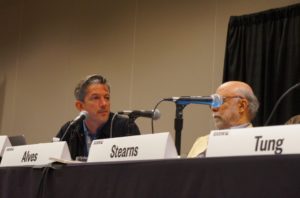In an era when terrorist organizations like ISIS are seen as a very real and constant threat to public safety, reporting from conflict zones has become increasingly dangerous for journalists. This increased risk also comes at a time when the media is struggling to fight against the overwhelming perpetuation of false news.
The panel Journalism in the Age of Terrorism featured speakers with an extensive background in foreign reporting and conflict-related news who discussed how this changing media environment is causing diminished investigative reporting from war-torn regions.
Documentarian Eric Matthies opened up the panel by discussing the kidnapping of journalists in Syria and what ripple effects these travesties have in the media community.
Photojournalist Nicole Tung, who currently reports from Istanbul, said her initial reaction to the news was similar to those of other journalists.
“As a journalist, we don’t stop because we can’t stop. We have to keep going and doing our work.”
University of Texas professor Rosental Alves commented on the effect these acts of violence against journalists have had in the journalism curriculum.
“New disciplines in journalism include required safety and trauma training, before going into trauma-heavy zones,” Alves said.
Tung agreed but admitted that no matter how much training and preparation a journalist has, “nothing can prepare you for what you see, encounter, and all of the trauma you witness.”
Josh Stearns of the Democracy Fund shared how the spike in violence against journalists has caused a shift in the news ecosystem. Outlets are relying increasingly on freelancers as well as social reporters on the ground who share their stories via live stream and social media channels. Stearns also touched on the domestic threats to journalists who fall victim to politically-motivated legal attacks.
“Criminality comes through legal tactics that attempt to silence journalism.”
Stearns said the media needs to figure out how to build up a new infrastructure that can protect news organizations and journalism from violence and legal threats.
In addition to these obstacles, journalists are also faced with the dangers of false news. When asked about the role this plays in her investigative work on the ground, Tung said, “it’s almost impossible to verify actual events because you’re seeing things through the local and activist perspectives.” She added that the chain of information is another compromising factor in maintaining true reporting. Things are often lost or added to the message as it makes its way back to the public.
Alves followed by touching on how the digital revolution has created a new ecosystem for news. Video manipulations are becoming increasingly abundant and it can be difficult for audiences to distinguish the truth from a lie.
 Matthies then steered the conversation toward the public opinion of journalists. He said the lack of government action after the violent kidnapping and torture of American journalists, as well as those from other parts of the world, percolated through the public causing an overall sentiment of apathy towards journalists.
Matthies then steered the conversation toward the public opinion of journalists. He said the lack of government action after the violent kidnapping and torture of American journalists, as well as those from other parts of the world, percolated through the public causing an overall sentiment of apathy towards journalists.
Tung agreed and pointed out how the United States’ distrust of media differs drastically from France’s perspective.
“When the French journalists were kidnapped in Syria, there was a very public response that prompted the government to do something,” she said. “There, the press is seen as such a key part of the democracy.”
Trung suggested the reluctancy of the U.S. to come forward and make a statement after the kidnappings was due to their political hesitancies of not wanting to cross that metaphorical red line one way or the other.
Matthies concluded the panel with a powerful quote from Florence Aubenas, a journalist who was kidnapped and tortured in Baghdad during the first Iraq war.
To defend the freedom of the press is defending you, it’s not defending us. You are watching it and you are also responsible for it. – Florence Aubenas
The panelists then opened the floor for questions and I had one of my own.
